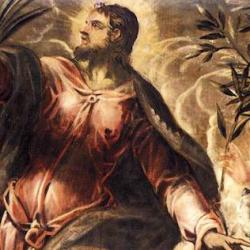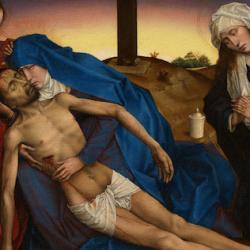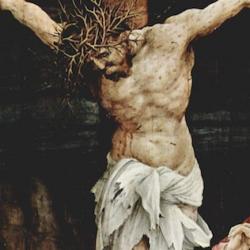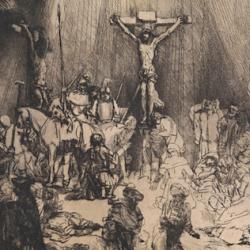In his recently-published Sign and Sacrifice, Rowan Williams notes the continuity between the post-Maccabean theology of martyrdom and the death of Jesus. For intertestamental Jews, as for Romans, death could be noble and triumphant.
There’s a radical discontinuity too. For Jews (as for Romans), martyrs triumphed because they died in an effort to liberate their nation from their enemies. Not Jesus: “Jesus did not die defending the nation or the law against foreign oppression. He died because those who ruled his nation had collaborated with the oppressor.” This caught early Christians “in a sort of pincer movement: here was somebody condemned by the state and rejected by the religious authorities of his own people.”
Rather than a death for the sake of the nation, Jesus’ death is proclaimed as a revelation of the love of God, as “proof that God loves us, and so is also a demonstration of the kind of God that we are talking about.”
Seems an odd way to demonstrate love. How does a crucified Messiah demonstrate the love of God? Williams answers: “Here is a divine love that cannot be defeated by violence: we do our worst, and we still fail to put God off. We reject, exclude and murder the one who bears the love of God in his words and work, and that love continues to do exactly what it always did. The Jesus who is dying on the cross is completely consistent with the Jesus we have followed through his ministry, and this consistency shows that we can’t deflect the love that comes through in life and death.”
Thus, “the cross is a sign of the transcendent freedom of the love of God. This is a God whose actions, and whose reactions to us, cannot be dictated by what we do. You can’t trap, trick or force God into behaving against his character. You can do what you like: but God is God. And if he wants to love and forgive then he’s going to love and forgive whether you like it or not, because he is free.”
God is utterly free of the cycles of retribution and revenge that destroy human life. He is “not caught up in any cycle” and so is “free to be who he decides to be.” He is who He is, the great I am, “and we can’t do anything about it.” He will demonstrate His love no matter how we try to shield ourselves or destroy Him.
This is gospel, “the good news of our powerlessness to change God’s mind.” Our powerlessness to deter God is good news because: “God’s mind is focused upon us for mercy and for life. God will always survive our sin, our failure. God is never exhausted by what we do. God is always there, capable of remaking the relationships we break again and again.”
The good news is good news about God, about the love of God that “belongs to a different order, not the order of power, manipulation and getting on top, which is the kind of power that preoccupies us.” It’s good news of the “defenselessness of the love of God, a love which has nothing but itself to rely on and yet somehow is all powerful.”















